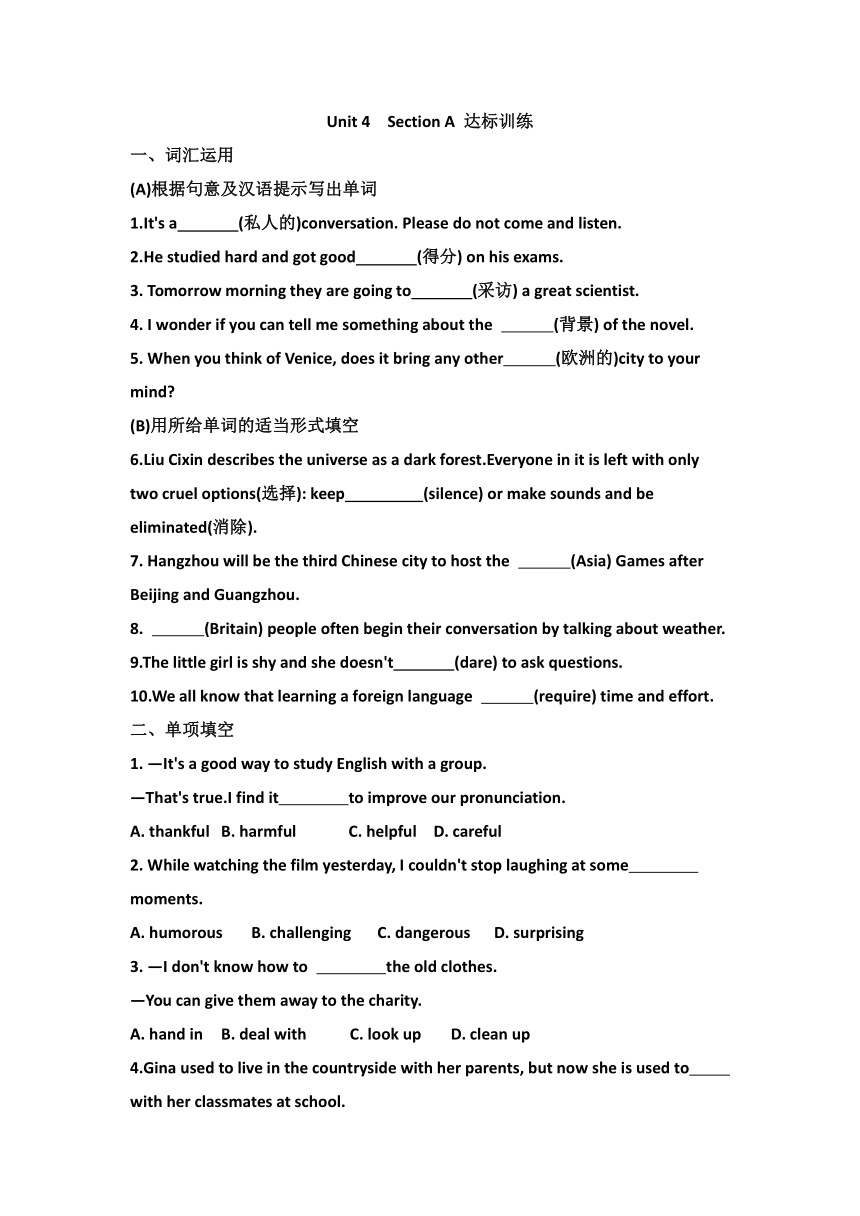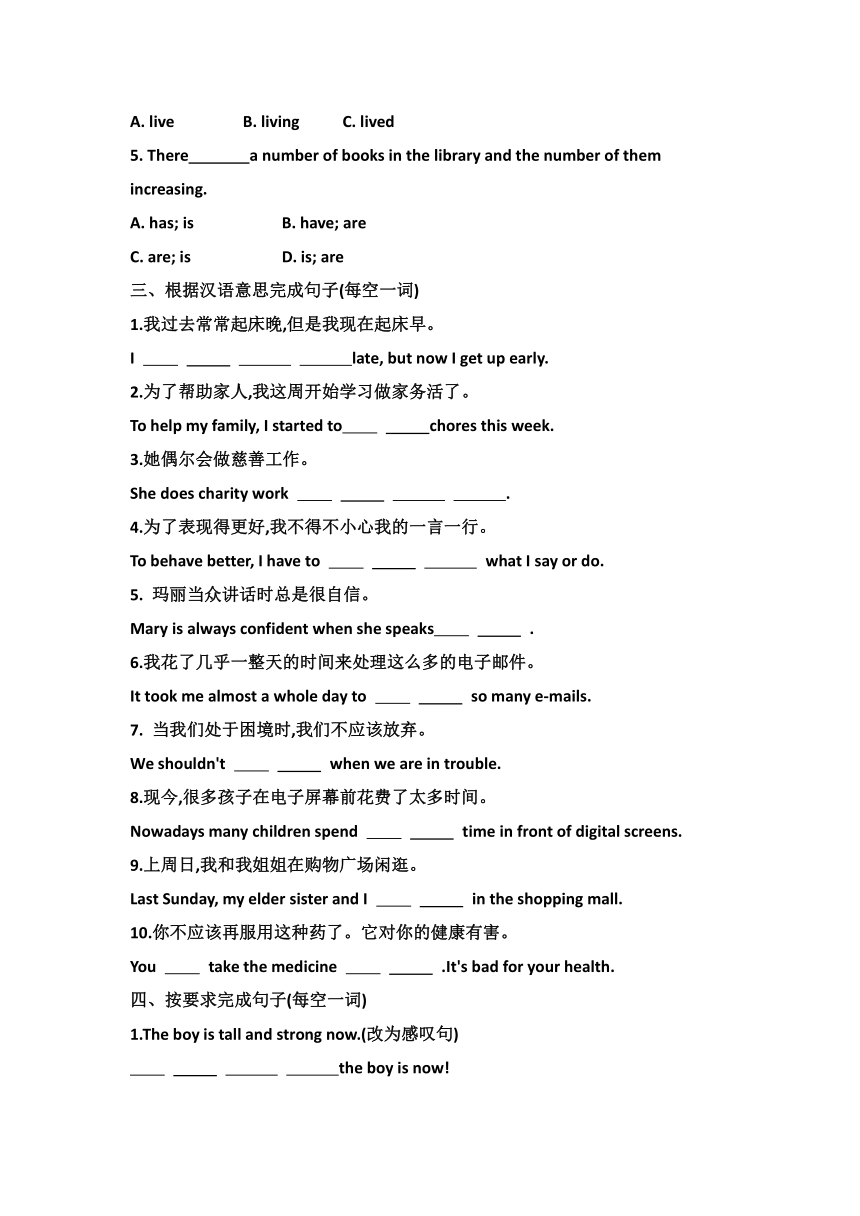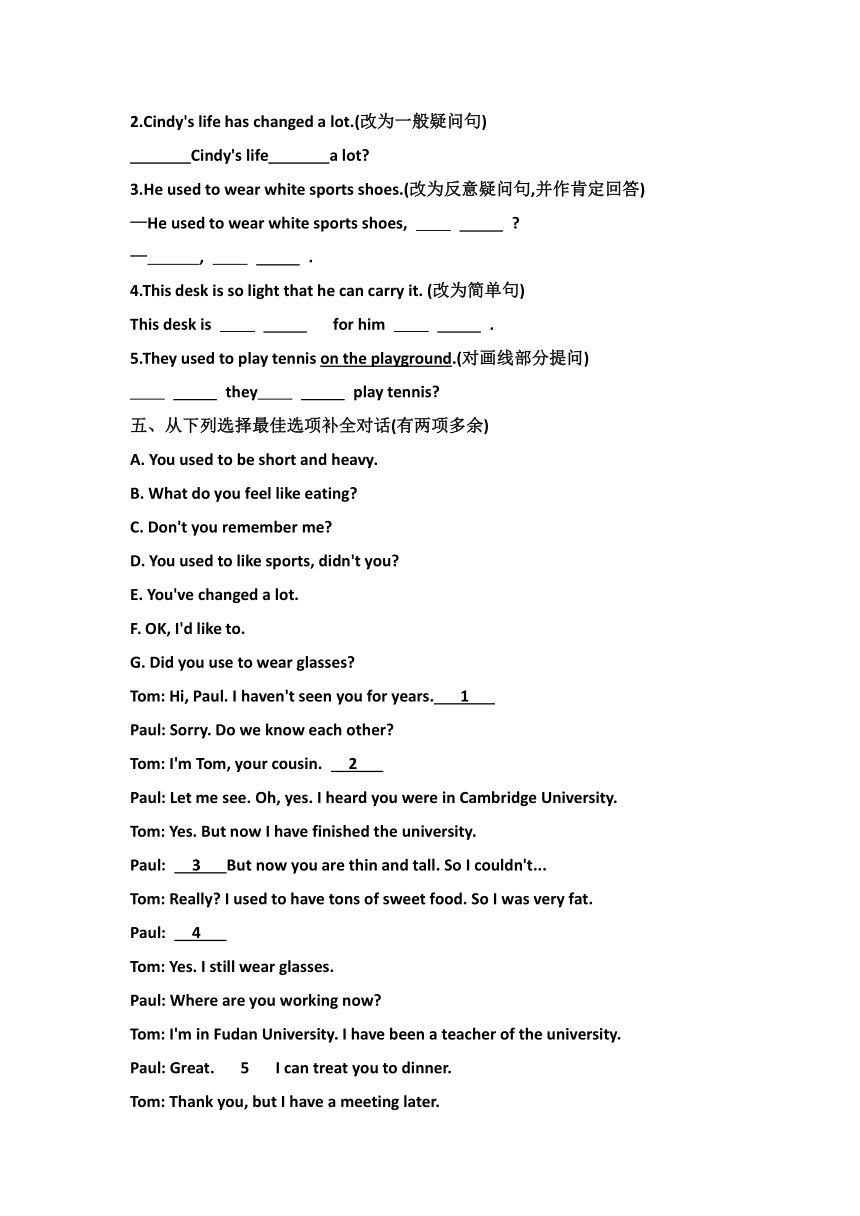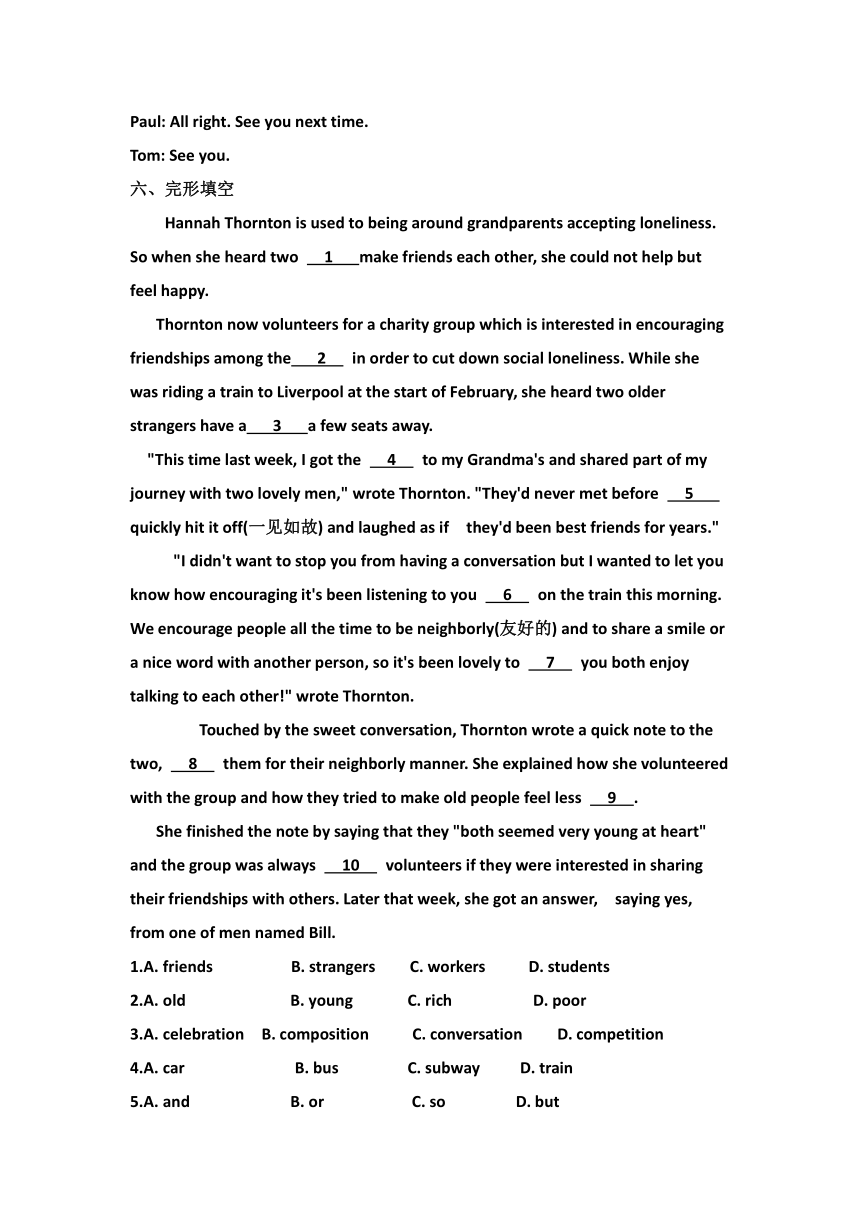Unit 4 I used to be afraid of the dark. Section A 达标训练(含答案解析)
文档属性
| 名称 | Unit 4 I used to be afraid of the dark. Section A 达标训练(含答案解析) |  | |
| 格式 | zip | ||
| 文件大小 | 23.4KB | ||
| 资源类型 | 教案 | ||
| 版本资源 | 人教新目标(Go for it)版 | ||
| 科目 | 英语 | ||
| 更新时间 | 2021-09-07 13:50:20 | ||
图片预览




文档简介
Unit
4
Section
A
达标训练
一、词汇运用
(A)根据句意及汉语提示写出单词
1.It's
a
(私人的)conversation.
Please
do
not
come
and
listen.
2.He
studied
hard
and
got
good
(得分)
on
his
exams.
3.
Tomorrow
morning
they
are
going
to
(采访)
a
great
scientist.
4.
I
wonder
if
you
can
tell
me
something
about
the
(背景)
of
the
novel.
5.
When
you
think
of
Venice,
does
it
bring
any
other (欧洲的)city
to
your
mind?
(B)用所给单词的适当形式填空
6.Liu
Cixin
describes
the
universe
as
a
dark
forest.Everyone
in
it
is
left
with
only
two
cruel
options(选择):
keep
(silence)
or
make
sounds
and
be
eliminated(消除).
7.
Hangzhou
will
be
the
third
Chinese
city
to
host
the
(Asia)
Games
after
Beijing
and
Guangzhou.
8.
(Britain)
people
often
begin
their
conversation
by
talking
about
weather.
9.The
little
girl
is
shy
and
she
doesn't
(dare)
to
ask
questions.
10.We
all
know
that
learning
a
foreign
language
(require)
time
and
effort.
二、单项填空
1.
—It's
a
good
way
to
study
English
with
a
group.
—That's
true.I
find
it to
improve
our
pronunciation.
A.
thankful
B.
harmful
C.
helpful
D.
careful
2.
While
watching
the
film
yesterday,
I
couldn't
stop
laughing
at
some moments.
A.
humorous
B.
challenging
C.
dangerous
D.
surprising
3.
—I
don't
know
how
to
the
old
clothes.
—You
can
give
them
away
to
the
charity.
A.
hand
in
B.
deal
with
C.
look
up
D.
clean
up
4.Gina
used
to
live
in
the
countryside
with
her
parents,
but
now
she
is
used
to
with
her
classmates
at
school.
A.
live
B.
living
C.
lived
5.
There
a
number
of
books
in
the
library
and
the
number
of
them
increasing.
A.
has;
is
B.
have;
are
C.
are;
is
D.
is;
are
三、根据汉语意思完成句子(每空一词)
1.我过去常常起床晚,但是我现在起床早。
I
late,
but
now
I
get
up
early.
2.为了帮助家人,我这周开始学习做家务活了。
To
help
my
family,
I
started
to
chores
this
week.
3.她偶尔会做慈善工作。
She
does
charity
work
.
4.为了表现得更好,我不得不小心我的一言一行。
To
behave
better,
I
have
to
what
I
say
or
do.
5.
玛丽当众讲话时总是很自信。
Mary
is
always
confident
when
she
speaks
.
6.我花了几乎一整天的时间来处理这么多的电子邮件。
It
took
me
almost
a
whole
day
to
so
many
e-mails.
7.
当我们处于困境时,我们不应该放弃。
We
shouldn't
when
we
are
in
trouble.
8.现今,很多孩子在电子屏幕前花费了太多时间。
Nowadays
many
children
spend
time
in
front
of
digital
screens.
9.上周日,我和我姐姐在购物广场闲逛。
Last
Sunday,
my
elder
sister
and
I
in
the
shopping
mall.
10.你不应该再服用这种药了。它对你的健康有害。
You
take
the
medicine
.It's
bad
for
your
health.
四、按要求完成句子(每空一词)
1.The
boy
is
tall
and
strong
now.(改为感叹句)
the
boy
is
now!
2.Cindy's
life
has
changed
a
lot.(改为一般疑问句)
Cindy's
life
a
lot?
3.He
used
to
wear
white
sports
shoes.(改为反意疑问句,并作肯定回答)
—He
used
to
wear
white
sports
shoes,
?
— ,
.
4.This
desk
is
so
light
that
he
can
carry
it.
(改为简单句)
This
desk
is
for
him
.
5.They
used
to
play
tennis
on
the
playground.(对画线部分提问)
they
play
tennis?
五、从下列选择最佳选项补全对话(有两项多余)
A.
You
used
to
be
short
and
heavy.
B.
What
do
you
feel
like
eating?
C.
Don't
you
remember
me?
D.
You
used
to
like
sports,
didn't
you?
E.
You've
changed
a
lot.
F.
OK,
I'd
like
to.
G.
Did
you
use
to
wear
glasses?
Tom:
Hi,
Paul.
I
haven't
seen
you
for
years.
1
Paul:
Sorry.
Do
we
know
each
other?
Tom:
I'm
Tom,
your
cousin.
2
Paul:
Let
me
see.
Oh,
yes.
I
heard
you
were
in
Cambridge
University.
Tom:
Yes.
But
now
I
have
finished
the
university.
Paul:
3
But
now
you
are
thin
and
tall.
So
I
couldn't...
Tom:
Really?
I
used
to
have
tons
of
sweet
food.
So
I
was
very
fat.
Paul:
4
Tom:
Yes.
I
still
wear
glasses.
Paul:
Where
are
you
working
now?
Tom:
I'm
in
Fudan
University.
I
have
been
a
teacher
of
the
university.
Paul:
Great.
5
I
can
treat
you
to
dinner.
Tom:
Thank
you,
but
I
have
a
meeting
later.
Paul:
All
right.
See
you
next
time.
Tom:
See
you.
六、完形填空
Hannah
Thornton
is
used
to
being
around
grandparents
accepting
loneliness.
So
when
she
heard
two
1
make
friends
each
other,
she
could
not
help
but
feel
happy.
Thornton
now
volunteers
for
a
charity
group
which
is
interested
in
encouraging
friendships
among
the
2
in
order
to
cut
down
social
loneliness.
While
she
was
riding
a
train
to
Liverpool
at
the
start
of
February,
she
heard
two
older
strangers
have
a
3
a
few
seats
away.
"This
time
last
week,
I
got
the
4
to
my
Grandma's
and
shared
part
of
my
journey
with
two
lovely
men,"
wrote
Thornton.
"They'd
never
met
before
5
quickly
hit
it
off(一见如故)
and
laughed
as
if
they'd
been
best
friends
for
years."
"I
didn't
want
to
stop
you
from
having
a
conversation
but
I
wanted
to
let
you
know
how
encouraging
it's
been
listening
to
you
6
on
the
train
this
morning.
We
encourage
people
all
the
time
to
be
neighborly(友好的)
and
to
share
a
smile
or
a
nice
word
with
another
person,
so
it's
been
lovely
to
7
you
both
enjoy
talking
to
each
other!"
wrote
Thornton.
Touched
by
the
sweet
conversation,
Thornton
wrote
a
quick
note
to
the
two,
8
them
for
their
neighborly
manner.
She
explained
how
she
volunteered
with
the
group
and
how
they
tried
to
make
old
people
feel
less
9 .
She
finished
the
note
by
saying
that
they
"both
seemed
very
young
at
heart"
and
the
group
was
always
10
volunteers
if
they
were
interested
in
sharing
their
friendships
with
others.
Later
that
week,
she
got
an
answer,
saying
yes,
from
one
of
men
named
Bill.
1.A.
friends
B.
strangers
C.
workers
D.
students
2.A.
old
B.
young
C.
rich
D.
poor
3.A.
celebration
B.
composition
C.
conversation
D.
competition
4.A.
car
B.
bus
C.
subway
D.
train
5.A.
and
B.
or
C.
so
D.
but
6.A.
working
B.
playing
C.
talking
D.
learning
7.A.
hear
B.
help
C.
let
D.
make
8.A.
wondering
B.
admiring
C.
asking
D.
agreeing
9.A.
difficult
B.
lonely
C.
expensive
D.
careful
10.A.
looking
at
B.
looking
after
C.
looking
up
D.
looking
for
七、阅读理解
As
a
student,
I
was
most
afraid
to
answer
questions
in
class,
and
I
found
that
the
students
around
were
just
like
me.
At
the
beginning
of
each
class,
when
the
teacher
asked
a
question,
I
always
lowered
my
head
because
I
was
afraid
that
the
teacher
saw
me.
One
day,
in
a
foreign
language
class,
Mr.
Black
gave
us
a
lesson.
He
wanted
us
to
be
active
in
class,
so
he
asked
us
some
questions,
but
no
one
answered.
"Let
me
tell
you
a
story
first,"
he
said."When
I
came
to
the
United
States
to
study,
the
university
often
invited
famous
people
to
make
speeches.
Before
the
beginning
of
every
speech,
I
found
an
interesting
thing.
The
students
around
me
always
took
a
card
folded
in
half,
wrote
their
names
in
bold(粗体)with
the
most
eye-catching
color,
and
then
placed
the
cardboard
on
the
seat.
So
when
the
speaker
needed
the
answers
from
the
students,
he
could
see
and
call
a
listener's
name
directly."
"I
couldn't
understand
that.
My
classmate
told
me
the
speakers
were
all
top
people,
who
meant
chances.
When
your
answer
was
to
his
surprise,
it
meant
he
might
give
you
more
chances.
In
fact,
I
really
saw
a
few
students
got
great
chances
because
of
that."
After
listening
to
the
story,
I
understood
that
the
chance
will
not
find
you
itself.
You
must
show
yourself
all
the
time
so
that
you
can
find
a
chance
on
the
card.
1.What
did
the
writer's
classmates
do
when
they
were
asked
questions?
A.
They
raised
their
hands.
B.
They
shook
their
heads.
C.
They
closed
their
eyes.
D.
They
lowered
their
heads.
2.What
does
the
underlined
word
"eye-catching"
in
Paragraph
2
mean
in
Chinese?
A.
引人注目的
B.
眼睛疼痛的
C.
目光呆滞的
D.
泪眼朦胧的
3.What
does
the
writer
mainly
want
to
tell
us?
A.
Doing
as
others
do
is
necessary.
B.
Answering
questions
bravely
is
easy.
C.
Making
others
interested
is
interesting.
D.
Showing
yourself
bravely
can
win
chances.
参考答案
一、词汇运用
(A)根据句意及汉语提示写出单词
1.private 句意:这是私人谈话。请不要来听。private是形容词,意为"私人的"。
2.scores/grades score/grade在这里是可数名词,意为"得分",get
good
scores/grades"获得好成绩"。
3.interview 句意:明天早上他们将要采访一位伟大的科学家。be
going
to
do
sth."将要做某事",空处使用动词原形。
4.background "the+名词+of"表示"……的……",为固定用法。
5.European 句意:当你想到威尼斯时,它会让你脑中想起了其他欧洲城市吗?European"欧洲的"。
(B)用所给单词的适当形式填空
6.silent keep
silent"保持安静",为固定搭配。
7.Asian 句意:杭州将是继北京和广州之后第三个举办亚运会的中国城市。分析句子结构可知,空处应用形容词修饰名词Games。
8.British 句意:英国人经常通过聊天气来开始他们的谈话。Britain"英国",是名词。空处修饰people,应用形容词British,表示"英国的"。
9.dare 句意:这个小女孩很害羞不敢问问题。此处dare为实义动词,表示"敢于,胆敢",空前有助动词doesn't,空处应用动词原形。
10.requires 句意:我们都知道学习一门外语需要时间和努力。本句为含有宾语从句的主从复合句,从句的主语为动名词短语,主句为一般现在时,根据句意可知从句也应使用一般现在时,故填requires。
二、单项填空
1.C 根据题干中的"和小组一起学英语是一种好方法"和"的确如此"可知,此处表示"我发现它对改善我们的发音是有帮助的",故所缺的词是helpful。
2.A humorous"幽默的,滑稽的";challenging"挑战性的";dangerous"危险的";surprising"令人惊讶的"。根据题干中的"我忍不住大笑"可推断,符合题意的词是humorous。
3.B ——我不知如何处理那些旧衣服。——你可以把它们捐给慈善机构。hand
in"上交";deal
with
"处理";look
up
"查阅";clean
up"收拾干净"。联系答语可知,此处指"如何处理旧衣服"。
4.B
句意:吉娜过去和她父母一起住在乡下,但现在她习惯于和同学们住在学校了。be
used
to
doing
sth."习惯于做某事",为固定搭配。
5.C 句意:图书馆里有很多书,且它们的数量正在增加。第一空为there
be句型,a
number
of
books表示复数概念,故应用are;"the
number
of+可数名词复数或代词"作主语,谓语动词应用单数形式。
三、根据汉语意思完成句子(每空一词)
used
to
get
up
2.take
up
3.from
time
to
time
4.be
careful
about
5.in
public
6.deal
with
7.give
up
8.too
much
9.hung
out
10.shouldn't;
any
more
四、按要求完成句子(每空一词)
1.How
tall
and
strong
2.Has;
changed
3.didn't
he;
Yes,
he
did
4.light
enough;
to
carry
5.Where
did;
use
to
五、从下列选择最佳选项补全对话(有两项多余)
1—5
ECAGB
六、完形填空
1.B 根据下文中的"she
heard
two
older
strangers
have
a
3 a
few
seats
away"可知选B。
2.A 根据下文中的"she
heard
two
older
strangers
have
a
3
a
few
seats
away"可知选A。
3.C 根据下文中的"I
didn't
want
to
stop
you
from
having
a
conversation"可知选C。
4.D 由第二段中的"While
she
was
riding
a
train
to
Liverpool
at
the
start
of
February"可知选D。
5.D "他们此前从未见过"与"他们很快一见如故"为转折关系,故用but。
6.C 根据上文中的"I
didn't
want
to
stop
you
from
having
a
conversation"可知,他们俩人在谈话。
7.A Thornton在火车上听到了两人的谈话,故hear"听见",符合语境。
8.B 根据下文Thornton写留言邀请两人作志愿者可推断,Thornton欣赏他们友好的举止。
9.B 根据第二段中的"in
order
to
cut
down
social
loneliness"可知选B。
10.D 根据下文中的"if
they
were
interested
in
sharing
their
friendships
with
others"可知,他们一直在寻找志愿者。
七、阅读理解
1.D 由第一段中的"As
a
student,
I
was
most
afraid
to
answer
questions
in
class,
and
I
found
that
the
students
around
were
just
like
me"以及"when
the
teacher
asked
a
question,
I
always
lowered
my
head"可知答案。
2.A 由第二段中的"So
when
the
speaker
needed
the
answers
from
the
students,
he
could
see
and
call
a
listener's
name
directly"可推知,学生们为了让自己的名字被看见,所以他们会用引人注目的颜色在纸板上写上他们的名字。
3.D 通读全文可知,作者以前和同学们一样,害怕在课堂上回答问题,听完老师讲的故事后,作者明白了勇敢地表现自己有的时候就意味着赢得机遇。
4
Section
A
达标训练
一、词汇运用
(A)根据句意及汉语提示写出单词
1.It's
a
(私人的)conversation.
Please
do
not
come
and
listen.
2.He
studied
hard
and
got
good
(得分)
on
his
exams.
3.
Tomorrow
morning
they
are
going
to
(采访)
a
great
scientist.
4.
I
wonder
if
you
can
tell
me
something
about
the
(背景)
of
the
novel.
5.
When
you
think
of
Venice,
does
it
bring
any
other (欧洲的)city
to
your
mind?
(B)用所给单词的适当形式填空
6.Liu
Cixin
describes
the
universe
as
a
dark
forest.Everyone
in
it
is
left
with
only
two
cruel
options(选择):
keep
(silence)
or
make
sounds
and
be
eliminated(消除).
7.
Hangzhou
will
be
the
third
Chinese
city
to
host
the
(Asia)
Games
after
Beijing
and
Guangzhou.
8.
(Britain)
people
often
begin
their
conversation
by
talking
about
weather.
9.The
little
girl
is
shy
and
she
doesn't
(dare)
to
ask
questions.
10.We
all
know
that
learning
a
foreign
language
(require)
time
and
effort.
二、单项填空
1.
—It's
a
good
way
to
study
English
with
a
group.
—That's
true.I
find
it to
improve
our
pronunciation.
A.
thankful
B.
harmful
C.
helpful
D.
careful
2.
While
watching
the
film
yesterday,
I
couldn't
stop
laughing
at
some moments.
A.
humorous
B.
challenging
C.
dangerous
D.
surprising
3.
—I
don't
know
how
to
the
old
clothes.
—You
can
give
them
away
to
the
charity.
A.
hand
in
B.
deal
with
C.
look
up
D.
clean
up
4.Gina
used
to
live
in
the
countryside
with
her
parents,
but
now
she
is
used
to
with
her
classmates
at
school.
A.
live
B.
living
C.
lived
5.
There
a
number
of
books
in
the
library
and
the
number
of
them
increasing.
A.
has;
is
B.
have;
are
C.
are;
is
D.
is;
are
三、根据汉语意思完成句子(每空一词)
1.我过去常常起床晚,但是我现在起床早。
I
late,
but
now
I
get
up
early.
2.为了帮助家人,我这周开始学习做家务活了。
To
help
my
family,
I
started
to
chores
this
week.
3.她偶尔会做慈善工作。
She
does
charity
work
.
4.为了表现得更好,我不得不小心我的一言一行。
To
behave
better,
I
have
to
what
I
say
or
do.
5.
玛丽当众讲话时总是很自信。
Mary
is
always
confident
when
she
speaks
.
6.我花了几乎一整天的时间来处理这么多的电子邮件。
It
took
me
almost
a
whole
day
to
so
many
e-mails.
7.
当我们处于困境时,我们不应该放弃。
We
shouldn't
when
we
are
in
trouble.
8.现今,很多孩子在电子屏幕前花费了太多时间。
Nowadays
many
children
spend
time
in
front
of
digital
screens.
9.上周日,我和我姐姐在购物广场闲逛。
Last
Sunday,
my
elder
sister
and
I
in
the
shopping
mall.
10.你不应该再服用这种药了。它对你的健康有害。
You
take
the
medicine
.It's
bad
for
your
health.
四、按要求完成句子(每空一词)
1.The
boy
is
tall
and
strong
now.(改为感叹句)
the
boy
is
now!
2.Cindy's
life
has
changed
a
lot.(改为一般疑问句)
Cindy's
life
a
lot?
3.He
used
to
wear
white
sports
shoes.(改为反意疑问句,并作肯定回答)
—He
used
to
wear
white
sports
shoes,
?
— ,
.
4.This
desk
is
so
light
that
he
can
carry
it.
(改为简单句)
This
desk
is
for
him
.
5.They
used
to
play
tennis
on
the
playground.(对画线部分提问)
they
play
tennis?
五、从下列选择最佳选项补全对话(有两项多余)
A.
You
used
to
be
short
and
heavy.
B.
What
do
you
feel
like
eating?
C.
Don't
you
remember
me?
D.
You
used
to
like
sports,
didn't
you?
E.
You've
changed
a
lot.
F.
OK,
I'd
like
to.
G.
Did
you
use
to
wear
glasses?
Tom:
Hi,
Paul.
I
haven't
seen
you
for
years.
1
Paul:
Sorry.
Do
we
know
each
other?
Tom:
I'm
Tom,
your
cousin.
2
Paul:
Let
me
see.
Oh,
yes.
I
heard
you
were
in
Cambridge
University.
Tom:
Yes.
But
now
I
have
finished
the
university.
Paul:
3
But
now
you
are
thin
and
tall.
So
I
couldn't...
Tom:
Really?
I
used
to
have
tons
of
sweet
food.
So
I
was
very
fat.
Paul:
4
Tom:
Yes.
I
still
wear
glasses.
Paul:
Where
are
you
working
now?
Tom:
I'm
in
Fudan
University.
I
have
been
a
teacher
of
the
university.
Paul:
Great.
5
I
can
treat
you
to
dinner.
Tom:
Thank
you,
but
I
have
a
meeting
later.
Paul:
All
right.
See
you
next
time.
Tom:
See
you.
六、完形填空
Hannah
Thornton
is
used
to
being
around
grandparents
accepting
loneliness.
So
when
she
heard
two
1
make
friends
each
other,
she
could
not
help
but
feel
happy.
Thornton
now
volunteers
for
a
charity
group
which
is
interested
in
encouraging
friendships
among
the
2
in
order
to
cut
down
social
loneliness.
While
she
was
riding
a
train
to
Liverpool
at
the
start
of
February,
she
heard
two
older
strangers
have
a
3
a
few
seats
away.
"This
time
last
week,
I
got
the
4
to
my
Grandma's
and
shared
part
of
my
journey
with
two
lovely
men,"
wrote
Thornton.
"They'd
never
met
before
5
quickly
hit
it
off(一见如故)
and
laughed
as
if
they'd
been
best
friends
for
years."
"I
didn't
want
to
stop
you
from
having
a
conversation
but
I
wanted
to
let
you
know
how
encouraging
it's
been
listening
to
you
6
on
the
train
this
morning.
We
encourage
people
all
the
time
to
be
neighborly(友好的)
and
to
share
a
smile
or
a
nice
word
with
another
person,
so
it's
been
lovely
to
7
you
both
enjoy
talking
to
each
other!"
wrote
Thornton.
Touched
by
the
sweet
conversation,
Thornton
wrote
a
quick
note
to
the
two,
8
them
for
their
neighborly
manner.
She
explained
how
she
volunteered
with
the
group
and
how
they
tried
to
make
old
people
feel
less
9 .
She
finished
the
note
by
saying
that
they
"both
seemed
very
young
at
heart"
and
the
group
was
always
10
volunteers
if
they
were
interested
in
sharing
their
friendships
with
others.
Later
that
week,
she
got
an
answer,
saying
yes,
from
one
of
men
named
Bill.
1.A.
friends
B.
strangers
C.
workers
D.
students
2.A.
old
B.
young
C.
rich
D.
poor
3.A.
celebration
B.
composition
C.
conversation
D.
competition
4.A.
car
B.
bus
C.
subway
D.
train
5.A.
and
B.
or
C.
so
D.
but
6.A.
working
B.
playing
C.
talking
D.
learning
7.A.
hear
B.
help
C.
let
D.
make
8.A.
wondering
B.
admiring
C.
asking
D.
agreeing
9.A.
difficult
B.
lonely
C.
expensive
D.
careful
10.A.
looking
at
B.
looking
after
C.
looking
up
D.
looking
for
七、阅读理解
As
a
student,
I
was
most
afraid
to
answer
questions
in
class,
and
I
found
that
the
students
around
were
just
like
me.
At
the
beginning
of
each
class,
when
the
teacher
asked
a
question,
I
always
lowered
my
head
because
I
was
afraid
that
the
teacher
saw
me.
One
day,
in
a
foreign
language
class,
Mr.
Black
gave
us
a
lesson.
He
wanted
us
to
be
active
in
class,
so
he
asked
us
some
questions,
but
no
one
answered.
"Let
me
tell
you
a
story
first,"
he
said."When
I
came
to
the
United
States
to
study,
the
university
often
invited
famous
people
to
make
speeches.
Before
the
beginning
of
every
speech,
I
found
an
interesting
thing.
The
students
around
me
always
took
a
card
folded
in
half,
wrote
their
names
in
bold(粗体)with
the
most
eye-catching
color,
and
then
placed
the
cardboard
on
the
seat.
So
when
the
speaker
needed
the
answers
from
the
students,
he
could
see
and
call
a
listener's
name
directly."
"I
couldn't
understand
that.
My
classmate
told
me
the
speakers
were
all
top
people,
who
meant
chances.
When
your
answer
was
to
his
surprise,
it
meant
he
might
give
you
more
chances.
In
fact,
I
really
saw
a
few
students
got
great
chances
because
of
that."
After
listening
to
the
story,
I
understood
that
the
chance
will
not
find
you
itself.
You
must
show
yourself
all
the
time
so
that
you
can
find
a
chance
on
the
card.
1.What
did
the
writer's
classmates
do
when
they
were
asked
questions?
A.
They
raised
their
hands.
B.
They
shook
their
heads.
C.
They
closed
their
eyes.
D.
They
lowered
their
heads.
2.What
does
the
underlined
word
"eye-catching"
in
Paragraph
2
mean
in
Chinese?
A.
引人注目的
B.
眼睛疼痛的
C.
目光呆滞的
D.
泪眼朦胧的
3.What
does
the
writer
mainly
want
to
tell
us?
A.
Doing
as
others
do
is
necessary.
B.
Answering
questions
bravely
is
easy.
C.
Making
others
interested
is
interesting.
D.
Showing
yourself
bravely
can
win
chances.
参考答案
一、词汇运用
(A)根据句意及汉语提示写出单词
1.private 句意:这是私人谈话。请不要来听。private是形容词,意为"私人的"。
2.scores/grades score/grade在这里是可数名词,意为"得分",get
good
scores/grades"获得好成绩"。
3.interview 句意:明天早上他们将要采访一位伟大的科学家。be
going
to
do
sth."将要做某事",空处使用动词原形。
4.background "the+名词+of"表示"……的……",为固定用法。
5.European 句意:当你想到威尼斯时,它会让你脑中想起了其他欧洲城市吗?European"欧洲的"。
(B)用所给单词的适当形式填空
6.silent keep
silent"保持安静",为固定搭配。
7.Asian 句意:杭州将是继北京和广州之后第三个举办亚运会的中国城市。分析句子结构可知,空处应用形容词修饰名词Games。
8.British 句意:英国人经常通过聊天气来开始他们的谈话。Britain"英国",是名词。空处修饰people,应用形容词British,表示"英国的"。
9.dare 句意:这个小女孩很害羞不敢问问题。此处dare为实义动词,表示"敢于,胆敢",空前有助动词doesn't,空处应用动词原形。
10.requires 句意:我们都知道学习一门外语需要时间和努力。本句为含有宾语从句的主从复合句,从句的主语为动名词短语,主句为一般现在时,根据句意可知从句也应使用一般现在时,故填requires。
二、单项填空
1.C 根据题干中的"和小组一起学英语是一种好方法"和"的确如此"可知,此处表示"我发现它对改善我们的发音是有帮助的",故所缺的词是helpful。
2.A humorous"幽默的,滑稽的";challenging"挑战性的";dangerous"危险的";surprising"令人惊讶的"。根据题干中的"我忍不住大笑"可推断,符合题意的词是humorous。
3.B ——我不知如何处理那些旧衣服。——你可以把它们捐给慈善机构。hand
in"上交";deal
with
"处理";look
up
"查阅";clean
up"收拾干净"。联系答语可知,此处指"如何处理旧衣服"。
4.B
句意:吉娜过去和她父母一起住在乡下,但现在她习惯于和同学们住在学校了。be
used
to
doing
sth."习惯于做某事",为固定搭配。
5.C 句意:图书馆里有很多书,且它们的数量正在增加。第一空为there
be句型,a
number
of
books表示复数概念,故应用are;"the
number
of+可数名词复数或代词"作主语,谓语动词应用单数形式。
三、根据汉语意思完成句子(每空一词)
used
to
get
up
2.take
up
3.from
time
to
time
4.be
careful
about
5.in
public
6.deal
with
7.give
up
8.too
much
9.hung
out
10.shouldn't;
any
more
四、按要求完成句子(每空一词)
1.How
tall
and
strong
2.Has;
changed
3.didn't
he;
Yes,
he
did
4.light
enough;
to
carry
5.Where
did;
use
to
五、从下列选择最佳选项补全对话(有两项多余)
1—5
ECAGB
六、完形填空
1.B 根据下文中的"she
heard
two
older
strangers
have
a
3 a
few
seats
away"可知选B。
2.A 根据下文中的"she
heard
two
older
strangers
have
a
3
a
few
seats
away"可知选A。
3.C 根据下文中的"I
didn't
want
to
stop
you
from
having
a
conversation"可知选C。
4.D 由第二段中的"While
she
was
riding
a
train
to
Liverpool
at
the
start
of
February"可知选D。
5.D "他们此前从未见过"与"他们很快一见如故"为转折关系,故用but。
6.C 根据上文中的"I
didn't
want
to
stop
you
from
having
a
conversation"可知,他们俩人在谈话。
7.A Thornton在火车上听到了两人的谈话,故hear"听见",符合语境。
8.B 根据下文Thornton写留言邀请两人作志愿者可推断,Thornton欣赏他们友好的举止。
9.B 根据第二段中的"in
order
to
cut
down
social
loneliness"可知选B。
10.D 根据下文中的"if
they
were
interested
in
sharing
their
friendships
with
others"可知,他们一直在寻找志愿者。
七、阅读理解
1.D 由第一段中的"As
a
student,
I
was
most
afraid
to
answer
questions
in
class,
and
I
found
that
the
students
around
were
just
like
me"以及"when
the
teacher
asked
a
question,
I
always
lowered
my
head"可知答案。
2.A 由第二段中的"So
when
the
speaker
needed
the
answers
from
the
students,
he
could
see
and
call
a
listener's
name
directly"可推知,学生们为了让自己的名字被看见,所以他们会用引人注目的颜色在纸板上写上他们的名字。
3.D 通读全文可知,作者以前和同学们一样,害怕在课堂上回答问题,听完老师讲的故事后,作者明白了勇敢地表现自己有的时候就意味着赢得机遇。
同课章节目录
- Unit 1 How can we become good learners.
- Section A
- Section B
- Unit 2 I think that mooncakes are delicious!
- Section A
- Section B
- Unit 3 Could you please tell me where the restroom
- Section A
- Section B
- Unit 4 I used to be afraid of the dark.
- Section A
- Section B
- Unit 5 What are the shirts made of?
- Section A
- Section B
- Review of Units 1-5
- Unit 6 When was it invented?
- Section A
- Section B
- Unit 7 Teenagers should be allowed to choose their
- Section A
- Section B
- Unit 8 It must belong to Carla.
- Section A
- Section B
- Unit 9 I like music that I can dance to.
- Section A
- Section B
- Unit 10 You're supposed to shake hands.
- Section A
- Section B
- Review of Units 6-10
- Unit 11 Sad movies make me cry.
- Section A
- Section B
- Unit 12 Life is full of the unexpected
- Section A
- Section B
- Unit 13 We're trying to save the earth!
- Section A
- Section B
- Unit 14 I remember meeting all of you in Grade 7.
- Section A
- Section B
- Review of Units 11-14
